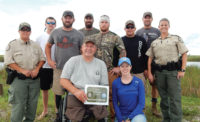As a group with solid construction experience and as members of the target workforce powering the industry’s future, ENR’s national Top 20 Under 40 have developed a good understanding of colleagues across the generations. They shared insights about how to keep co-workers on paths that are right for them and good for their employers.
“We are at war for talent—and we need to win this war,” says Robert Davis, a regional manager of the civil/structural division at Parsons. “It’s a war to keep people, maintain them, recruit them, and we need to be doing everything in our power or we’ll continue to be left behind.”
Team Workforce
Ashley Hoffman
Business Development Manager,
Layton Construction Co., Phoenix
Robert Davis
Northern California Regional Manager, Civil-Structural Division, Parsons
Oakland, Calif.
Helen Robinson
Branch Manager/Senior Project Manager, GEI Consultants
Exton, Pa.
Connie Zambianchi
President and Founder, Amaracon Testing and Inspections
Hicksville, N.Y.
Myesha McClendon
Vice President, Milhouse Engineering & Construction Inc.
Chicago
Connie Zambianchi, president of Amaracon Testing and Inspections, a Hicksville, N.Y., firm she founded in 2015, has perspective on what employees want and need as a veteran of several industry design and construction firms.
At Amaracon, employees start career-advancement training from the beginning, with a goal of constant growth, Zambianchi says. If individuals show initiative and want to grow faster, that drive is fostered. “We’ll invest in your future if you’re willing to invest in yourself,” she says, noting that a college education is not the only ticket to upward movement in construction.
She encourages employees to gain welder certifications and other special licenses, extras she added to her own P.E. license. “You can run projects or be a project manager without having a degree, which is something that I like to encourage,” Zambianchi says.
Concerns that technology will make some industry jobs and career paths obsolete are valid, but the key is adapting. “Job elimination is just part of growth, technology and evolution,” says Davis. Realize you “need to move up the value chain and figure something else out.”
Inspiring the next generation to commit to construction will require changing perceptions of what its participants actually do. That means current practitioners have to be personal industry career ambassadors.
Entering a classroom of very young students “in heels, you create a perception, so that image is in their mind and they know industry careers for women are an option,” says Helen Robinson, branch manager and senior project manager at GEI Consultants. “That’s powerful,” she points out.
Remembering in high school when “there was a lack of talent in the pharmaceutical world, so that’s the career that was pushed,” says Ashley Hoffman, business development manager at Layton Construction Co. “I think we can do the same.”
With secondary education costs getting more out of reach, Myesha McClendon, vice president of Milhouse Engineering & Construction Inc., believes loan forgiveness programs for construction-related degrees, similar to existing ones for teachers, are needed. She also says groups such as the American Society of Civil Engineers, Society of Women Engineers and National Society of Black Engineers must further extend their outreach to influence younger students.
All five professionals remain concerned about filling current vacancies, partly blaming the dot-com boom of the late 1990s to early 2000s. The shift into digital careers has led to a period of about five to 15 years during which there was not enough emphasis on physical sciences or engineering study.
“It’s a lot cooler to put a little furry hat on a cat in an app and send it to your friends and you can be a billionaire off that,” says Davis, based in Silicon Valley. “You have people who are 25, working at Facebook and earning $175,000 a year. I can’t compete with that. Not even close.”
Davis emphasizes the need to promote construction’s profound and longer-lasting impact on society. “Engineering of things like water supply and wastewater treatment—that’s the basis of civilization in my mind,” he says. “I’m proud of what we do. Your app? It’s cute, but in six months, no one’s going to use it anymore.”
Partnership
Hoffman notes the particular challenge in meeting craft-trade shortages. “We really struggle with the lack of people that have the technical skills to want these jobs,” she says. “There’s a preconceived notion about ‘dying trades,’ but they’re needed in the worst way right now and are not even out there for us to hire.”
“You can run projects or be a project manager without having a college degree, which is something I like to encourage.”
– Connie Zambianchi
McClendon advocates a partnership between unions and other trades’ groups and state unemployment offices that will create a new path into construction. More legislated training and development funding is another pipeline.
“We’re allocating dollars to transportation projects, but we also need to allocate dollars to funding education and technical programs” in industry fields, she says.
Meanwhile, the group says company managers must raise the level of respect given to all in the workplace. “There needs to be a way to bridge gaps and get the generations to come together to respect each other’s input,” says McClendon.
Hoffman also encourages individuals to accelerate their own advocacy: “If you were excluded or weren’t offered an opportunity because you’re a woman, you still step in, show up and make your presence known.”
Robinson says “understanding people’s personalities and traits can help you lead them.” But now as boss, Zambianchi acknowledges the challenge of workplace diversity: “It’s hard to do, but sometimes we need to be forced to do things to make change.”
Backstory
Ashley Hoffman is a third generation classically trained dancer.
Robert Davis is one of 11 brothers and sisters.
Helen Robinson received the Girl Scouts’ highest award, the Gold Award, and now leads her daughter’s Junior troop.
Connie Zambianchi is an avid rock climber.
Myesha McClendon is a twin and won her seventh grade spelling bee.




